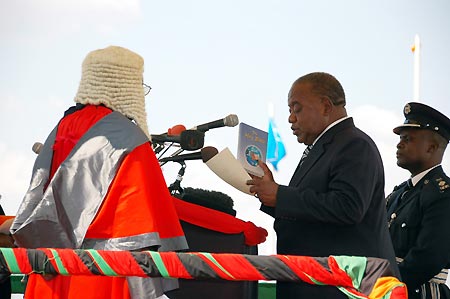Rupiah Banda was sworn in in Lusaka on Sunday as Zambian president after he narrowly won the presidential by-election held on Thursday.
 |
| Rupiah Banda delivers a speech at the inauguration ceremony in Lusaka, capital of Zambia, on Nov. 2, 2008. Rupiah Banda was sworn in here Sunday as Zambian president after he narrowly won the presidential by-election held on Thursday.[Xinhua Photo] |
In a speech given at the inauguration ceremony, he vowed to take over the legacy of the late president Levy Mwanawasa and achieve economy prosperity for all Zambians.
He hailed Mwanawasa as democratic champion against corruption, vowing to continue the fight against corruption.
He also promised to enrich the nation with Zambia's copper reserve and maintain Zambian hospitality to foreign investors.
"We will continue to welcome foreign investments," he said.
Banda's predecessor had been lauded worldwide for adopting a prudent economic policy, making efforts to promote agricultural production and encourage foreign investment.
The rising price of copper and flowing foreign investment revived Zambia's copper industry while the pragmatic economic policy of the government led to the writing off of huge foreign debts and remarkable economic growth. The growth rate stood at 5 percent annually since 2001, when Mwanawasa started his first term. Inflation declined to a single-digit figure in 2006, the first time in three decades.
As the death of Mwanawasa brought political uncertainty to Zambia, the southern African country's economy has also begun to feel pressure. The copper price has plummeted by about 50 percent, affecting the foreign exchange earning of the country where copper and related products are major exports.
Zambia's currency kwacha has experienced increased depreciation. The exchange rate has fallen from about 3,000 kwacha against one U. S. dollar to about 4,500 against one. According to the Barclays Bank Zambia's treasury market report, this week's trade began at 4, 550 kwacha and 4,570 kwacha for buying and selling per dollar.
The inflation rose to 14.2 percent year-on-year in September from 13.2 percent in August, according to the data from Zambia's Central Statistical Office.
The Zambian authorities have reportedly lowered the forecast of the country's economic growth for 2008 from the original 7 percent to 6 percent.
Banda urged reconciliation between all parties.
Banda was deputy to Mwanawasa and was acting president during the vacancy of the presidency as a result of Mwanawasa's death in France in August after a stroke.
Banda took part in the polls on behalf of the ruling Movement for Multiparty Democracy.
The presidential term is five years in Zambia. The winner in the by-election will wrap up the tenure left by Mwanawasa which is expected to end by 2011.
(Xinhua News Agency November 3, 2008)